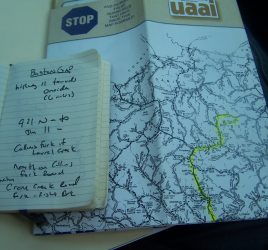SFA About the Book
In June 1935, Bobby Baker got in his car in Hamilton, Ohio and headed south towards the Central Appalachian town of Manchester, Kentucky, the place his family helped found in early 1800s.
Bobby was an enigma. A man bound by generations of family honor and duty, he still managed to spend a great deal of time away from the homestead. He would bounce between the bar he owned in Cincinnati, in which he ran card games and sold Kentucky moonshine, and Manchester, where the family had lived for more than 100 years until they’d escaped a few years back.
When he walked out the door he was always well dressed, he always had a new car, and nobody in the family was quite sure when he’d be coming home. What business he meant to conduct and who he conducted that with depends very much upon which member of my family tells the story. He definitely ran moonshine. He may have moved stolen cars. He almost certainly had a girlfriend in Kentucky who was helping him out.
Whatever his business, he attracted attention. The police would routinely visit the family farm in Indiana looking for the still and liquor his family kept buried on the property. As Bobby headed towards Manchester, he did so knowing that word had gone out that “bad” Bakers weren’t welcome in town anymore. Just a few weeks before, Bobby’s cousin Frank had been gunned down in the streets of Manchester, and his body lay untouched for hours.
Since Clay County’s founding in 1807, the Bakers (and the Gerrards) had run up against the powerful White and Howard clans. While many of the clashes centered on economic and political influences in the years, by the mid-850s the feud had turned bloody. By the turn of the 20th century, the blood feud had turned against the Bakers. After a series of particularly violent clashes at the turn of the century, Bobby, his wife, and their 9 children fled to Ohio.
Still, Bobby wasn’t going to be run out of town. He drove right into downtown with his two friends, Lloyd Baker and Ed Manning. As he came down through downtown somebody fired a shot through his car’s windshield, killing him instantly. The car slammed against a curb before coming to a stop. As with Frank’s murder, nobody immediately came for the body and nobody was arrested.
Although nobody knew at the time, Bobby Baker’s death marked the end of the Clay County War, a bloody and relentless feud that stretched from the early 1800s until the middle of the Depression.
The making of a narrative
In many ways, the Clay County War was just a longer, bloodier version of types of feuds that have become legend throughout the Appalachian region. As the mythologies of these fights seeped into the consciousness of American history, they have taken on a much larger cultural significance than they should. They’ve become so ingrained in our collective conscious that the mythology has become truth.
You can hardly avoid the “feuding mountain man” stereotype of the region on television, in magazines, or in books.With all of these images surrounding us, it’s hard not to see the image of rural mountain folks largely cut off from urban society.
Through the story of my family, the Bakers, we begin to see a more complex and compelling story about Appalachia and the people who settled the region. Bobby Baker’s death marked a transition for the Baker family, which had arrived on the shores of Boston in 1624 after emigrating from Buckinghamshire, England at the behest of the Crown in order to manufacture guns for the New World.
This once proud family — which had helped shape the American gun industry, ventured deep in Appalachia to settle parts of North Carolina and Kentucky, and sought to set up educational structures — was crushed between the push of the American national expansion and the pull of the natural resources in the Appalachian region that promised intrepid men the opportunity to strike it rich, and leave a mark on the world.
What was left for the Bakers, as it was for many who found themselves in similar positions, was poverty, a skill set in trades that were no longer valued, and a crumbling infrastructure that ensured a bleak future in the place they’d once called home.
A real story of America
While So Far Appalachia traces the Baker family history, this isn’t a family memoir. Instead Baker story is a launching point to explore what it means to be American. Through my family’s story, I’ll explore why guns are so important to families, why public education faces so much scepticism, why poverty exists in Appalachia, and why Americans celebrate civic engagement while denigrating the government.
So Far Appalachia is the story of America, but maybe not the America we’re used to discussing in public spaces. This isn’t a story about feuding hillbillies anymore than it’s a story about the rugged self-made man, neither of which has much basis in reality.
This is the other story about America.



